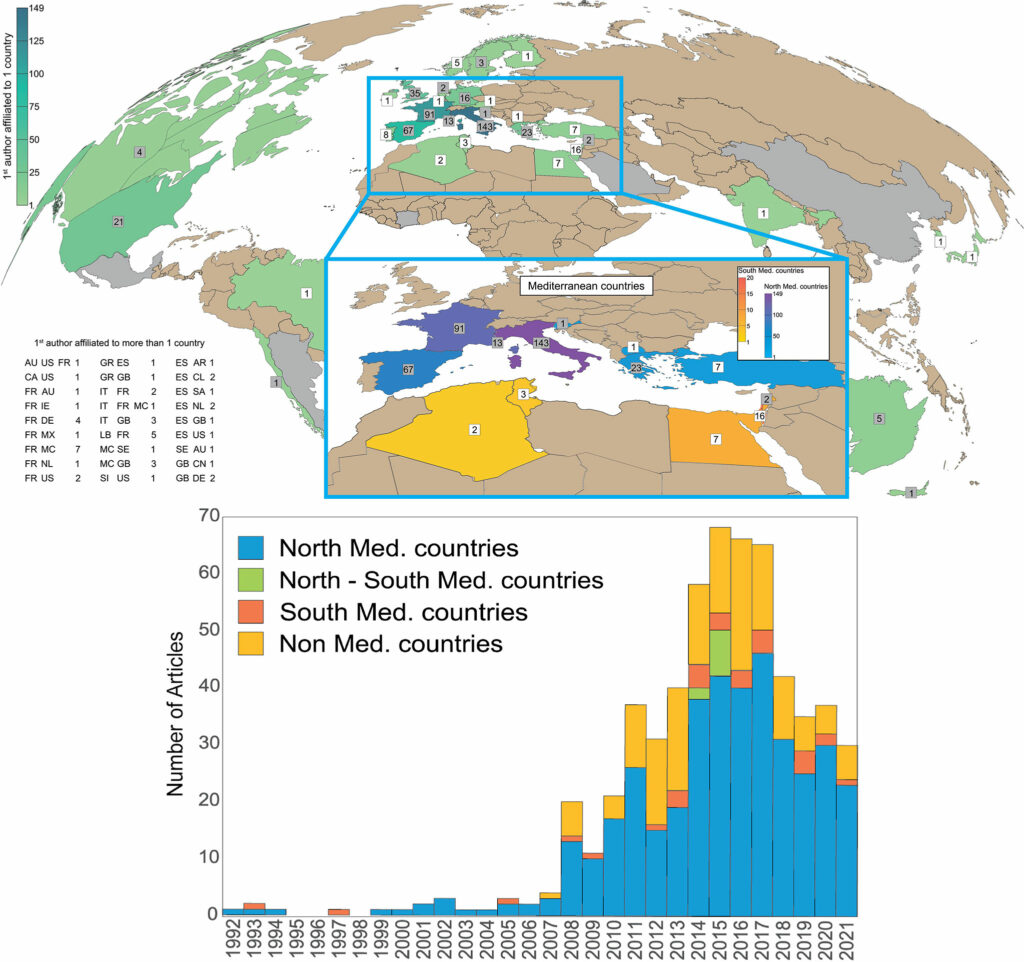A new review paper, “Ocean acidification research in the Mediterranean Sea: Status, trends and next steps“, has just been published in Frontiers in Marine Science. It analyzes the acidification trends in the Mediterranean Sea, the future projections, the impacts on marine organisms and ecosystems’ services, and the policy-governance of ocean acidification in the Mediterranean. This review gives a clear picture of various ocean acidification aspects, highlighting the knowledge gaps that science needs to tackle during the UN Ocean Decade, to lead to more efficient research and policies. This work was conducted thanks to 16 scientists from the Northern and Southern parts of the Mediterranean basin in the framework of the Ocean Acidifation Mediterranean Hub (OA Med-Hub).
Abed El Rahman Hassoun, Chair of the OA Med-Hub, highlights for us some of the key messages of this important analysis and study.
Current trends and future projections of the Ocean Acidification in the Mediterranean Sea
- Since the pre-industrial era, the acidification trend has varied between -0.055 and -0.157 pH units with slight differences between intermediate and deep water masses, with a wider range of acidification rates compared to the Atlantic and the global ocean.
- Due to the particular features of the Mediterranean Sea, anthropogenic CO2 is efficiently transferred to deep layers (compared to the global ocean) and is present in all water masses of the Mediterranean Sea, in its various sub-basins.
- Under the most pessimistic of the “Special Report: Emissions Scenarios” (SRES) of the IPCC (2007), the Mediterranean Sea pH will continue decreasing with higher rates in the Eastern part of the basin, possibly due to changes in the circulation & in water temperature expected to occur in the Mediterranean Sea.
Research content and main knowledge gaps
- The vast majority of research dealing with OA chemistry includes two different combinations of the seawater carbonate system measurable parameters: pH and Total Alkalinity: 34%, Total Alkalinity and Dissolved Inorganic Carbon (26%).
- To assess OA effects on Mediterranean organisms, scientific efforts focused on calcifying organisms (~ 37%, such as mollusks, corals, echinoderms, crustaceans, etc.) and autotrophs (~ 29%, algae, phanerogams, phytoplankton). Microbes, small mollusks (mainly pteropods) and sponges are among the least studied.
- Most of the OA publications are dealing with the biological response to OA through experimental studies and research conducted in natural CO2 gradients (~ 50%). Only 2% of the publications are dealing with carbon dioxide removal techniques that might be applied.
- Of all studies looking at OA effects on marine organisms, ~78% looked at the conventional OA single driver (pH or CO₂). While it is becoming crucial to include all relevant drivers when evaluating organismal responses (temperature, nutrients, UV…), only 3% of studies looked at more than two drivers.
A clear geographical gap
- Italy, France and Spain are the countries with the highest number of OA studies in the region. This induces a large number of OA studies being focused in the Western basin, predominantly conducted by these countries.
- OA studies were mainly implemented in the Western basin of the Mediterranean with more than 65% of the total studies, while only 20% were conducted in the Eastern basin, followed by 15% at the Mediterranean scale.
- The Algero-Provencal and Ionian sub-basins are currently the least studied Mediterranean areas.

A lack of results dissemination
- 86% of OA articles are peer-reviewed journal articles. The scientific community is clearly interested in producing scientific material, while communication products dedicated to disseminate OA results (targeted reports, policy-briefings, etc.) to a broader audience (policymakers, the public) are not a priority.
Hassoun A. E. R., Bantelman A., Canu D., Comeau S., Galdies C., Gattuso J.-P., Giani M., Grelaud M., Hendriks I. E., Ibello V., Idrissi M., Krasakopoulou E., Shaltout N., Solidoro C., Swarzenski P. W. & Ziveri P., 2022. Ocean acidification research in the Mediterranean Sea: status, trends and next steps. Frontiers in Marine Science 9: 892670. doi: 10.3389/fmars.2022.892670. Article
Abed El Rahman Hassoun is a scientific researcher working on climate change trends and effects, with special attention to OA and the Mediterranean Sea. He is currently working at the GEOMAR Helmholtz Centre for Ocean Research in Kiel, Germany. He is the Chair of the Ocean Acidification Mediterranean Hub and a co-champion of the outcome 6 of the UN Ocean Decade Programme OARS (GOA-ON : OARS – Outcomes). He contributed as a Coordinating Lead Author for the MedECC First Mediterranean Assessment Report (MAR1, Chapter 4 – Ecosystems).
The Global Ocean Acidification Observing Network (GOA-ON) has encouraged grass-roots formation of regional hubs to foster communities of practice for the efficient collection of comparable and geographically distributed data to assess ocean acidification and its effects and to support adaptation tools like model forecasts. The Mediterranean Ocean Acidification Hub is a network that connects Mediterranean scientists who are working and are interested in ocean acidification in the Mediterranean Sea and inludes scientists from nine countries in the region: Algeria, Egypt, France, Greece, Italy, Lebanon, Morocco, Spain, and Turkey.
